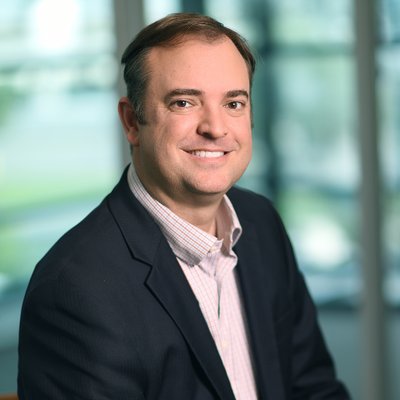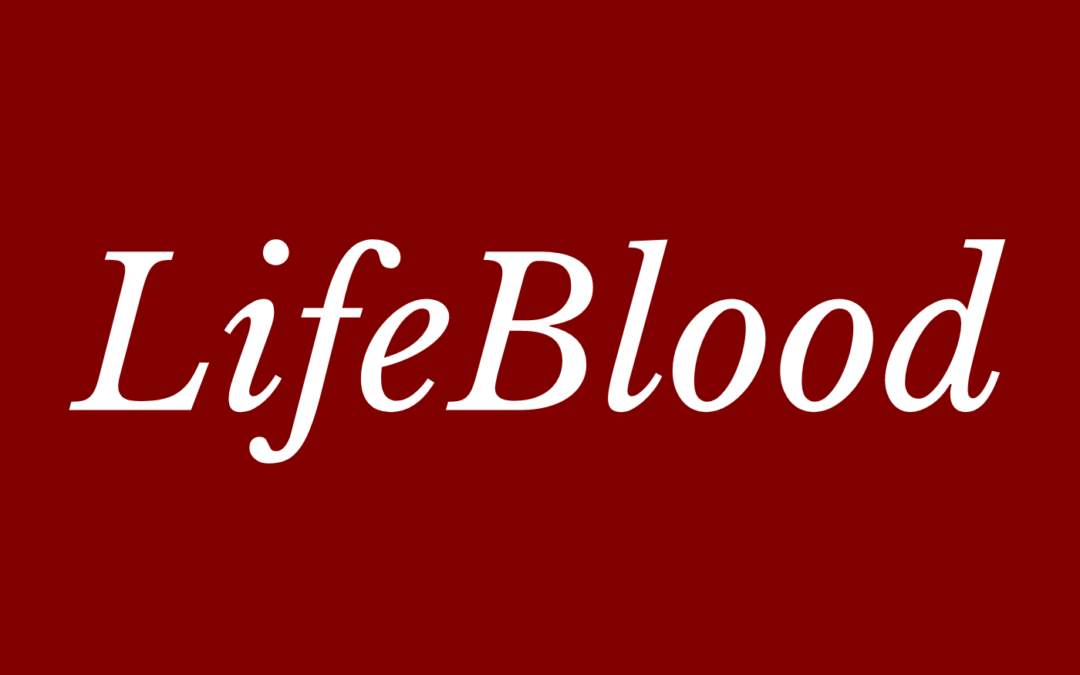Financial Wellness with Scott Spann
According to a recent survey, over half of American employees are financially illiterate, and 80% would like financial education as an employee benefit. Scott Spann talks about financial wellness and how companies can help their people get on the right track!
Listen to us On
About the Episode
LifeBlood: We talked about financial wellness, the disturbing reality that half of American employees are financially illiterate, how employees can help their pepe become more financially successful, and how technology is helping to make it happen with Scott Spann, PhD, CFP and Senior Director of Financial Education at BrightPlan.
Listen to learn why everyone needs a plan for their money!
For the Difference Making Tip, scan ahead to 17:20!
You can learn more about Scott at Brightplan.com, Facebook, Twitter, Instagram and LinkedIn.
Thanks, as always for listening! If you got some value and enjoyed the show, please leave us a review wherever you listen and subscribe as well.
You can learn more about us at MoneyAlignmentAcademy.com, Twitter, LinkedIn, Instagram, Pinterest, YouTube and Facebook or you’d like to be a guest on the show, contact George at [email protected].

George Grombacher
Lifeblood Host

Scott Spann
Guest
Episode Transcript
Come on.
We live well. This is George G. And the time is right welcome today’s guest strong and powerful Scott Spann. Scott, are you ready to do this? Let’s do it. Let’s let’s let’s go. Scott is the Senior Director of Financial Education with bright plan. They’re an organization providing total financial wellness, and leading all employees to financial success. excited to have you on. Scott, tell us a little about your personal life some more about your work and why you do what you do.
Scott Spann 0:39
Awesome. Well, thanks for having me here. George. I live in Charleston, South Carolina with my wife and two kids 15 and 12 year old and also my home office companion, seven year old golden doodle and I love my work as a certified financial planner practitioner. I’ve been focusing on this just pioneering this workplace financial wellness movement, and I am a bright plans Senior Director of Financial Education.
george grombacher 1:06
I love it. What’s the golden doodles name?
Scott Spann 1:09
Muffy Vander bears her full name keep it formal. Not my selection but we
george grombacher 1:17
called out our name what I hear bark or shine out of the room right now.
Scott Spann 1:21
Thankfully, she’s in the in the free from hearing her zone.
george grombacher 1:27
Good enough. Love it. So talking about pioneering the world of financial wellness seems like that that word. It came into existence relatively recently. And now it’s it’s it’s it’s become popular. So tell me a little bit about how that’s sort of what it is and how people are focusing on more.
Scott Spann 1:49
Yeah, so the the term financial wellness really just started to grow over the last couple of decades. And it started somewhat, it’s you know, I hate to say it a marketing term, just you know, it, you know, no one really had a clear definition of what financial wellness really means. But it’s something we all feel like we want, we need that in our lives. And, and so what we’ve seen that kind of progress from financial education, a lot of that focused on retirement and investing to a more holistic approach where we now have a really good definition of what financial wellness is, it’s a multi dimensional concept, in in simple terms, it’s just progressing confidently towards life goals with the clear action plan. And there’s that objective component to it. So we can measure and see how we’re doing in our financial lives. But also there’s that subjective component, and that’s more of our money mindset. And, and I think they’re both really powerful ways of looking at just our financial well being overall, but helps us move the needle in that positive direction to not only see where people in general as a whole are headed, but also how we can collectively create programs through workplace financial wellness programs, and even individual financial advisors, really adopting a financial wellness mindset to their practice, to help just further on people along towards reaching those most important life goals a little bit.
george grombacher 3:23
And certainly anytime, we as people, we as human beings are attempting to tackle big problems make sense to me to take that integrated approach to not just talking about tactics or strategies, but also to talk about that subjective stuff. So the way our minds work and our mindset, so I appreciate that. Where are we at? Just sort of globally, I know that y’all spend a lot of time and resources and doing the survey, tell me, tell me where we’re at. Yeah,
Scott Spann 3:51
we are, we’re in a place where things are getting better, but there’s a lot of a lot of awareness and concern that needs to be shifted towards this financial wellness area. And so, in bright plans 2021 financial wellness barometer survey, we found that only 20% of the respondents could answer three out of four basic financial literacy questions. And so, you know, that’s aligned with similar studies that show us about four and seven Americans are financially illiterate and report being unable to manage their finances confidently. So this is an area where we need solutions and we need more. We need a more holistic approach to how we solve this because traditionally, most people just don’t have access to financial guidance and advice unless they can afford it. So that’s where the workplace financial wellness movement helps to solve that, and helps companies helps organizations as well and and we know just also through our research that based on that financial wellness survey, over 80% of employees actually want support and guidance from their employers on personal financial matters. So, so the numbers are out there that say people are looking for help, which is a positive sign. But that financial stress, especially in the middle of a global pandemic, isn’t an area where we need to focus more resources on addressing those concerns.
george grombacher 5:23
Interesting, I appreciate you sharing that. And certainly appreciate appreciate y’all doing doing the survey. There’s a lot of really interesting stuff there sort of troubling stuff. There are big opportunities there. I think that that for me, one of the things that jumped off the page was that 80% of employees are interested in getting help and guidance from their employer is that that probably helps a lot because I feel like a lot of business owners, entrepreneurs, they that they don’t want to be matriarchal or patriarchal towards their employees, they don’t want to be pushing, but hearing that well actually appreciate that. But this is something that people are wanting, that probably helps to shift the conversation.
Scott Spann 6:10
Yeah, it’s definitely something that people want. And knowing that this financial wellness just as a as a workplace benefit, it’s out there, it’s available. This is becoming one of those most sought after benefits, especially in recent years, that trend just continues to, to have that positive movement there. And so with all that wave of uncertainty out there regarding just how to best manage our personal finances, a lot of people are turning to financial wellness programs through their work place to be able to find that that trusted resource and that’s that’s been a challenge is is just when it comes to personal finances, who do we turn to, and anyone out there can call themselves a financial planner. So that’s why you know, what we found the best total financial wellness solution to be is one that pairs that that digital platform, so access to potentially life changing content to, to have access to, you know, how do I make the best move to create a budget when I’ve never budgeted in the past? How do I eliminate debt? but also how do I have that peace of mind knowing that I’m protecting my family, having insurance and estate planning, also part of that holistic discussion, and, and then having that live human advisor support, it’s invaluable? And that’s something that when you think about just building a total financial wellness solution, the research really supports it, the more engaged people are, the better they tend to be financially, speaking from their well being standpoint, but also, the more they participate in different levels of services, whether it be a solution that is that digital component, having a financial coaching call, or even the ability to attend live webinars, that more engagement leads to better outcomes, better resort results and lower financial stress.
george grombacher 8:07
Yeah, amen. So y’all are seeing the problem. And you know, the the needs of a 25 year old are different than the needs of a 65 year old, potentially, not necessarily, but potentially, somebody just getting started or somebody is getting close to retiring. People need to get out of debt, they need to budget they need to learn about investing in insurance and estate planning, oh my gosh, how do we how do we take this and actually distill it down and then deliver it in a way that you’re not going to just get people’s eyes to sort of glaze over. So we’ll talk me through how you all sort of drink from a firehose or teach other people to drink from a firehose?
Scott Spann 8:51
Well, for one, it starts with having the right people providing that financial guidance. And by having that, that being being a fiduciary is one, you know, essential component, making sure that the person that we’re we’re putting out there to help address those tough questions, whether it’s the 25 year old, just trying to deal with that mountain of student loan debt, or someone that’s preparing for retirement anywhere in between, we want to make sure that they have somebody that’s always going to operate in their best interest. And that has a clear understanding of what that total financial wellness solution could look like for that person. So we know that finances, they just touch every aspect of a person’s life, whether we realize it or not. And then we want to make sure that that we’re giving people that guidance to meet them where they’re at. And I think it all starts with awareness of being able to just assess where we were talking with somebody that we truly know what their goals are, we know what they’re working towards. But we also know what that money mindset looks like. We know a little bit about their money history, because we We talked a lot about financial literacy and how important that is. But there’s also that knowing doing gap or that behavior gap when it comes to following through. So I think helping guide people and coach them to not only show them what they need to do, but walk them along the way, automate things as much as we can help them find ways to make the good decisions in their financial lives, automatic things as simple as just photo 401k enrollments, contribution rate escalators, but also automating debt payments, automating savings, and so whether whether we’re meeting somebody in a financially stressed position, or somebody looking to just enhance what are already they’ve built a solid foundation, you got to before we can be an expert, as a financial planner, we got to let the client or the person we’re working with be an expert in their lives first, listen, and that helps us provide the best guidance possible.
george grombacher 10:56
Yeah, a lot of really good stuff there for sure. The the read people providing the guidance and the advice and delivering the information, need to meet people where they are. And I mean, that’s such a, that’s such an important thing. And we have so much shame around money, that if I’m not if I’m talking over their heads, or if I’m, you know, talking down to them, then they’re gonna tune out. So that’s such an important thing. Then automating things, but my goodness, the more I can take my hands off the wheel, you know, that’s that’s the that’s, that’s, that’s really better for everybody. How do you, how do you? How do you coach people to start that conversation with themselves about figuring out what their money history or their money mindset? Is? That just curious about how, how that process kind of works? Yeah, well,
Scott Spann 11:55
I think the biggest start is just helping people to, to know what questions to ask themselves. And then also just creating that safe space to realize that, like, you said, money still pretty taboo, we would rather talk about other topics, then money with most people, and just letting letting people understand that it’s okay to ask those tough questions on yourself. But also, just knowing how to assess where you stand. And I think that’s where that, that digital component to this, this financial wellness approach really helps people just walk through in a focused way before they actually talk to human advisor. And those, you know, those questions that they need to address or automated where as much as possible, they can be. And then that way that conversation, when you do talk to a coach or advisor, it’s more focused, and it’s more goal, goal oriented. And you can use that digital component, come back to those financial wellness measures just to see how you’re doing and to track that progress over time, get those gentle reminders, get those nudges and know that, you know, you don’t have to be hyper focused on your finances all the time to still make some positive movements. And I think as long as we set those parameters, it helps people know what they should be focusing on, and breaks down the barriers.
george grombacher 13:21
Yeah, for sure, I think a time that I can get a step by step process. And while there’s no guarantees that the steps have been shown to get somebody from, where they want to go to where they are, to where they want to go, then I can follow those steps and having access to information that I can be consuming on my own sort of doing my own independent work. But then when something comes up, or it’s just I want another set of eyes, am I doing this right? Being able to interact with if it’s a coach or an advisor? Tell me little bit more about that.
Scott Spann 13:59
Yeah, so it’s, it’s, it’s that just in time learning, so based on goals, it’s not just trying to overwhelm people with this huge financial literacy curriculum. The the bright plan Academy really focuses on goals, and then that education supports those goals. And so, so we find that, you know, if you provide that waterfall approach, or what traditional financial advisors have done, here’s your beautiful financial plan, I used to create those beautiful plans that had a nice little Action List of 20 to 30 things you need to do over the course of the next 12 months or so. But if we break it down into bite sized chunks, meet people where they’re at, and provide the supporting education, that’s when you get you know, that education leading to action. And I can we can use a best next steps approach and the digital financial wellness coach helps support that. And and I think that’s, that’s where education or financial literacy really starts to move the needle and we See that real change in financial wellness because we have action to support the learning?
george grombacher 15:05
Yeah. I love it. I love just in time learning, the main thing that we all know that we’re ready to receive information when when we’re ready to receive it. And sometimes it takes, unfortunately, having something bad happened that motivated us to, you know, to change our health behaviors, or we have an emergency that requires a cash infusion, and oh my gosh, I don’t have it, what am I going to do that really motivates it. So just being there and giving people, those actionable things to be doing? Because to your point, if you gave me a list of 30 things that I needed to do to get my financial life together, well, then I’m probably not going to do that. So I appreciate that. I love it. So you mentioned the Academy, you, you mentioned the coaching, how, how long has it taken y’all to develop this platform? And how are you consistently evolving?
Scott Spann 16:06
Yeah, so at Brite plan, were just we’re focusing on advocating for employee total financial wellness. So the platform, I believe, has, I believe we are now in because this year five, of continuing to evolve that platform. And so what what we do with that total financial wellness solution is, essentially it’s making financial success attainable for everyone. So regardless of age, life stage, where you are in the process, and it’s, you know, four pillars are really what define the right plan, solution. So it’s learn it’s plan, invest, and manage. And all four of those pillars really tie in to that that definition of financial wellness, making sure we’re not just looking at the objective, how are we doing? How are we measuring that progress? But also that subjective are? Am I confident? Am I growing in my financial capability? Do I feel like I’m really able to move forward in my financial life with with purpose and meaning?
george grombacher 17:09
I love it. Learn plan, invest in manage? Perfect. Well, Scott, people are ready for that difference making tip? What do you have for them?
Scott Spann 17:20
All right, George, everyone needs a plan. Create your financial wellness plans that focus on life, not just money, it all starts with awareness. So know where you stand today. and identify just two simple ways you can assess your overall financial wellness. So starts with that basic behavior. Create that spending analysis, but also know how you know know what that debt to income looks like your savings rate. And then finally, just rate yourself a scale of one to 10 or skeletal one to 100. how satisfied are you with your current financial situation? And that final piece of awareness doesn’t hurt to ask if your employer offers some type of total financial wellness solution to help you move the needle in your own financial lives.
george grombacher 18:02
Well, I think that that is great stuff that definitely gets come up. Come on. Scott, thank you so much for coming on. Where can people learn more about you? And how can employers and employees look into bringing bright plan to their workplace
Scott Spann 18:18
excellent, George Well, they can go to bright plan calm learn more about the certified for for fiduciary Excellence Program that we have total financial wellness solution and really look forward to answering any questions we might have about how we can take this movement of total financial wellness to the masses.
george grombacher 18:39
Love it. Well, if you enjoyed this as much as I did show Scott your appreciation and share today’s show with a friend who also appreciates good ideas, go to bright plan COMM And check out the greater resources and get involved with the movement. Thanks good Scott. Thanks a lot, George. And until next time, keep fighting the good fight. We’re all in this together.
Transcribed by https://otter.ai
More Episodes
Where Does Money Come From? How to Find Meaningful Work
Where does money come from? For the vast majority of us, it comes from work. It’s earned. Once you’ve earned and saved money, you can create investment income that can be passive. But for our conversation today, let’s talk about doing meaningful work you enjoy...
Why a Sense of Urgency is Essential for Personal Financial Success
To reach your most important financial goals, you need a sense of urgency. When we’re young, we think we have all the time in the world, so we’re prone to procrastination. As we get older, our sense of urgency develops naturally, but can lead to stress and...
How to Develop Healthy Perspectives on Money and Personal Finance
Healthy perspectives must be cultivated and constantly nurtured. For some, it’s innate. We all know the happy and positive person who nothing seems to bother. For the rest of us, myself included, having a healthy perspective requires work. But it’s work worth...
Do You Have to Be Self Sacrificing to Become Financially Successful?
Is being self sacrificing a requirement for financial success? Yes. There’s a powerful proverb that nicely sums this up, “Blessed are those who plant trees under whose shade they will never sit.” Here’s the good news; you can plant the tree and sit underneath...
Personal Sovereignty and Your Personal Finances
Personal sovereignty means everybody has the right to pursue their desires, and reap the rewards of their efforts. How does money relate to this? Having money doesn’t automatically give this to you, and it’s not required to have it. But being financially secure...
The Four Keys to Accepting Personal Responsibility for Your Finances
The four keys to accepting personal responsibility for your finances. It’s my fault, and no one else’s. All of it. I own the good, the bad, and the ugly. The choices, the thinking, the money. My past, present and future. I own all of it. And so should...
How to Live a Rich Life
What is a rich life? For me, it’s doing the work I want to be doing. Spending time with the people I want to spend time with. And thinking the thoughts I want to think. It’s having the freedom and ability to do those things, and to do them on my terms. Money...
What it Takes to Get Good with Money
How do you get good with money? You could have rich parents. Winning the lottery might help. What about playing in the NFL or NBA? Would any of those help you get good with money? No. They might bring you money, but they won’t help you to get good with...
How to Make Change Happen in Your Financial Life in 11 Steps
If you’re wondering how to make change happen in your financial life, you’re in good company. Americans are behind with our personal finances, and to get on the right track, we need to change our behaviors. We need to learn many of life’s lessons through...
Join the show.
Interested in being on the show? Tell me a little bit more about you and what you’d like to talk about!














